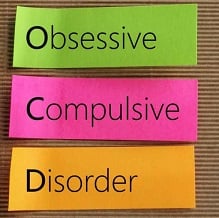Questioning Whether You Have OCD When You Have OCD
Questioning Whether You Have OCD When You Have OCD

Often patients, in the course of their treatment for OCD, will question whether they actually have OCD or not. This doubt feels different to them than the doubt arising from the intrusive thoughts that initially brought them into treatment. But this doubt about having OCD is OCD! OCD demands certainty and convinces the sufferer that bad things will happen if they’re not certain. The content of the intrusive thoughts is always irrelevant, but the content can distract patients (and sometimes clinicians) from dealing with uncertainty and risk.
In the initial stages of treatment for OCD, when I’m evaluating a new patient and setting up a treatment protocol, I tell the patient that I believe they have OCD, explain my reasoning, and describe how Exposure and Response Prevention (ERP) works (if that’s my determination after a thorough evaluation). I will also alert my patients that in the course of treatment they may question their OCD diagnosis because of the very fact that they have OCD. We discuss how obsessions can be about anything, including OCD.
After the initial evaluation, doubt about whether they have OCD or not usually emerges after patients have successfully used ERP and their symptoms are abating. They are not as fearful of their intrusive thoughts and they can usually let those intrusive thoughts hang out in their minds without attaching much significance to them. They have also reduced the amount of mental or behavioral rituals they engage in and are less avoidant of situations that trigger their obsessions. But there is still some doubt and this new way of thinking about intrusive thoughts has not been yet been fully ingrained. A patient might say something like this: “I’m not as bothered by my intrusive thoughts about harming my daughter, but what if I don’t have OCD? Then the thoughts mean I’m a deviant, especially because I’m not bothered by them as much.”
I tell my patient, “Getting better has triggered another OCD thought which is: ‘What if I don’t have OCD?’ OCD will try to instill doubt that your decrease in symptoms is evidence that you may be a deviant after all, because you’re less bothered by the thoughts. It’s circular thinking that can never be satisfied. The only way to get out of questioning yourself is to say, ‘I don’t know and I don’t need to know. Maybe I have OCD, maybe I don’t. I might be a deviant. Maybe I’ll harm my daughter, maybe I won’t. One can never know for sure, so I’m not going to search for the answer.’”
At this point in treatment, I try not to reassure my patients that they have OCD, if that is what their obsession is focused on. Reassurance will be only momentarily satisfying to them and is likely to perpetuate the obsession that they must be absolutely sure they have OCD. I reiterate that the content of their obsessions is irrelevant and point out how OCD has tricked them by instilling doubt about their diagnosis.
I encourage my patients to proceed with embracing the uncertainty that they may or may not have OCD and to refrain from rituals such as, seeking reassurance, looking up symptoms of disorders, and/or checking their thoughts. I emphasize that OCD is tricky. It morphs and changes over time and folks with OCD can get caught up with seeking certainty before they realize it’s OCD rearing its ugly head again – because it’s instilled doubt about something new. They will get stuck on the content of the obsession and their need to be safe and sure, rather than seeing OCD’s process, which is always the same. I remind them that whenever they have an intrusive thought that demands attention and certainty, they can deal with that thought by saying, “I don’t know. Life is about risk and uncertainty. I’m choosing to be uncertain, so I can live a freer life.”
I ask my patients to continue the therapy work they’ve been engaged in while being unsure that they actually have OCD. ERP will now include dealing with the intrusive thoughts and doubt that they have OCD. Eventually, most patients realize that all of these intrusive thoughts, whatever the content, are just like spam email. The spam is in their brains, but those messages (thoughts) don’t need to be opened, examined, or answered. They don’t need any response at all.











